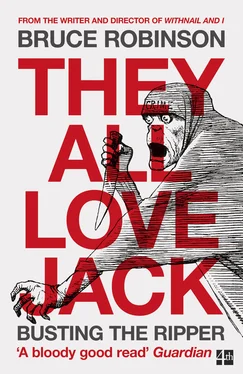Pinto interrogated his man over a period of days. The suspect had an impeccable Oxford accent, excellent socio-geographic knowledge, backed up by documentation that was as good as it gets. Down to the last little parochial nuance, he had an answer for everything, and seemed totally and utterly kosher.
Even so, Pinto was convinced he was dealing with an exceptionally talented spy whose true provenance was Berlin. But he couldn’t crack him, so he invited him out to lunch. Ten minutes later they were walking up The Strand, about to cross it to go to the chosen restaurant when, as they stepped off the kerb, Pinto screamed, ‘Look out!’ – and he got his German because the bastard looked the wrong way.
‘We drive on the left in England, old boy.’
That is an expert in action. In that one inspired moment, all the lies, all the carefully contrived subterfuge, and all the mystery fell to bits. I’m afraid my narrative will take rather longer to make its point than that flash of inspiration from Pinto. But I believe that the Ripper is just as vulnerable. Nailing this aberration means looking beyond the masquerade and requires but a single word. So look out, Jack! We’re stepping off the kerb, and I’m going to bust your arse.
B.R.
2 May 2015
We must return to Victorian values.
Margaret Thatcher, 1983
Reactionary nostalgia for the proprieties of Victorian England is unfortunate, like a whore looking under the bed for her virginity. Thatcher was perhaps confused because there were no drug busts in nineteenth-century England, few prosecutions for cruelty to children, and little recorded sex crime.
But who needs to force his attentions, with twelve hundred harlots on the streets? There was sex aplenty, at prices all could afford. At the bargain end you could fuck for the price of a mug of tea.
As far as narcotics were concerned there was even less of a problem, because getting smashed wasn’t illegal. Any toff on his way to the Athenaeum could stroll into Harrods and demand half an ounce of their finest cocaine. There was no ‘war on drugs’. The only drug wars in the Victorian epoch were those conducted by Englishmen in soldiers’ uniforms trying to get the Chinese hooked. If they refused to become junkies, they murdered them. Hundreds were strung up outside their own homes. When Victoria’s Prime Minister Lord Palmerston had finally achieved stability of the market, the dealers moved in, shipping their opium out of British Calcutta – 5,000 tons a year by 1866. What today are quaintly called ‘street values’ were astounding, and the revenues to the Crown require no less a word. British ‘administrators’, i.e. pushers, computed that in Fukien province eight out of ten adults were addicted, and nine out of ten in Canton. A complete marketing success. 1
One of the outstanding paradoxes of the Victorian age was its obsession with morality, when morality there was none. When it came to sex, Victorian hypocrisy rose to the very ether. The age of consent (determined by an all-male Parliament) was twelve. More often than not, however, consent didn’t come into it. Children were regularly sold into upmarket brothels as a leisure facility for gentlemen (little girls sometimes having their genitals surgically repaired to sustain the fiction of fresh goods). Champagne on the house, of course, padded chambers available on request. The beating of a common child into bloody insensibility with a whip may not have gained you the epithet of a ‘good egg’ at the club, but it wouldn’t have put you into prison either.2 It was men like W.T. Stead who got banged up for trying to do something about it.
William Thomas Stead was one of the great Victorians, a powerful and influential journalist, frequently vilified by the midgets of his trade who were anxious of his sincerity and success. He and Bramwell Booth, of Salvation Army fame, attempted to expose upper-class depravities by going out and buying a thirteen-year-old girl for a fiver. He published a full report of it in the Pall Mall Gazette , titled ‘The Modern Babylon’.3 This didn’t go down at all well with the Establishment (many politicians being punters), and the pair of them ended up in the dock at the Old Bailey.
‘Nothing less than imprisonment’, farted The Times . Mr Justice Lopes got on with it. ‘William Thomas Stead – I regret to say that you thought it fit to publish, blah, blah … and that you deluged our streets and the whole country with an amount of filth, blah, blah, blah … and I don’t hesitate to say, will ever be a disgrace to journalism.’4
Three months’ hard labour.
In 1888 you could fuck a child for five shillings, but you couldn’t read Zola. What the Establishment didn’t like about Emile Zola was his treatment of the working class, who he had the French neck to represent as human.
In his novel Germinal , for example, a coalminer not only falls in love with a girl Capital has reduced to an animal, but he also forms an embryonic trade union. Good God, two horrors in one! The Right Honourable’s wig must have lifted six inches into the air. Like Stead, Ernest Vizetelly (the British translator and publisher of Zola) got three months.
But there was a darker, deeper fear abroad in Zola’s mines, indeed in the minds of the Victorian Establishment. It was the voice from the abyss, the voice of Socialism, howling, ‘Enough, enough. Get off your all fours in the darkness, and stand on two feet like men.’
London was the richest city on earth. Bar none. A Baedeker guide of the period wrote: ‘Nothing will convey a better idea of the stupendous wealth of London than a visit to its docks.’ Eighteen months after an unprecedented working-class riot in Trafalgar Square in November 1887, London’s docks were hit by a cataclysmic strike.5 A Mr Norwood, for management, put it down to ‘dark deliberations of a Socialist Congress in Switzerland’. He was believed then, and might even be now. But I think the strike was more likely to have been caused by the habitual agony of three hundred men fighting over one job, the ‘most ravenous, that is, potentially the cheapest’, getting it. The rest could crawl off and die. And many did, one man actually starving to death on Cannon Street Road.
Enquiries were made into his accommodation:
In it is a woman lying on some sacking and a little straw, her breast half eaten away with cancer. She is naked but for an old red handkerchief over her breast and a bit of sail over her legs. By her side a baby of three and three other children. Four of them. The eldest is just nine years old. The husband tried to ‘pick up’ a few pence at the docks – the last refuge of the desperate – and the children are howling for bread. That poor woman who in all her agony tries to tend her little ones …6
The Queen sent a bunch of posies to the East End – not for the dying woman, but for the Sisters of Jesus, who were teaching girls to sew. In 1888, at Swan & Edgar, Piccadilly, you could order an evening gown and have these scrofulous, albeit industrious little Whitechapel fingers make it for you to wear at the soirée that very night. That very year, the Earl of Dudley threw a party for his ever-hungry but already overfed friend Edward, the Prince of Wales. The dinner service was specially made for the occasion by Sèvres. It had the royal glutton’s crest on it, and cost £22,000.
At about the time of the description of the dying woman in Whitechapel, historians liked to kid the British that they went to war over such outrages. Victorian schoolchildren were informed of one such escapade. It featured a stinking cellar full of men, women and children, and was colloquially known as ‘the Black Hole of Calcutta’.
Читать дальше











